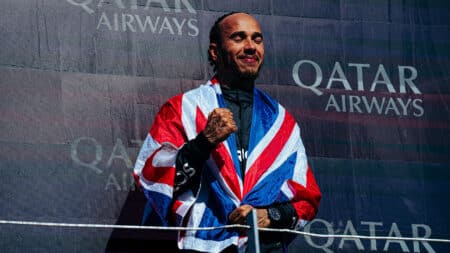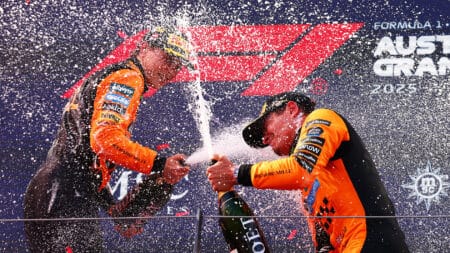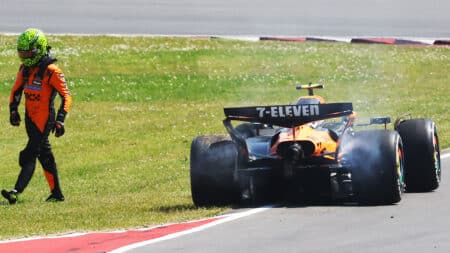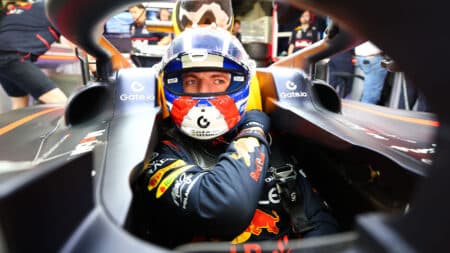
Why 2024 British GP was Hamilton's greatest F1 win
Lewis Hamilton hadn't won in almost three years – and then produced a sensational victory at Silverstone 2024. James Elson explains why it was his best ever
The man from Haguenau in Alsace is a phenomenon: 106 podiums from 156 World Rally Championship starts; 831 fastest stage times; and 1372 points. Record after record after record.
His most serious accident along this blazing trail was the 2006 mountain bike tumble that broke his right humerus. The injury cost him two rounds of that season’s WRC – but not the third of his (as it stands) eight consecutive world titles.
The numbers shout easy domination. Yet on the occasions that it has come to the clutch – against Ford’s Marcus Grönholm in 2006 and ’07 and Mikko Hirvonen in 2009 and 2011, plus Sébastien Ogier, his bumptious, talented Citroën team-mate, also in 2011 – he has calmly uncorked the extra necessary speed and/or political smarts to prevail.
He’s won on Tarmac, snow and gravel; in Asia, the Americas, Australasia and Europe; over the chilling jumps of the 1000 Lakes – twice – and on the Tour of Corsica’s baked twists and turns. He’s won the Deutschland Rally eight times, in Argentina and Spain on seven occasions apiece, and the Monte and in Mexico on six.
Yet there’s still some debate whether he’s the greatest there has ever been.
True, the WRC’s strength in depth has waned in recent years – it’s pretty much been Ford (in the main) chasing Citroën since 2006. Economics and viewing demographics are contributory factors. But so is Loeb’s extended loyalty to Citroën. It’s not impossible to beat him, but plenty have given up trying: Subaru, Skoda, Mitsubishi, Hyundai, Peugeot and now Mini. Ford is still in there swinging, while VW, with Ogier straining at his leash, clearly fancies its chances in 2013. But that’s it. A short list.
It wasn’t so so-so, however, when Citroen Loeb-ed its grenade in 2002: all the manufacturers above bar Mini; Richard Burns, Grönholm, Carlos Sainz, Colin McRae, Tommi Mäkinen and Juha Kankkunen – then with 13 world titles between them – plus Petter Solberg, Gilles Panizzi, Markko Märtin, François Delecour and Kenneth Eriksson. Yet Loeb would have won the Monte, round one, but for an irregular tyre swap and the subsequent time penalty that dropped him to second place.
This was only the reigning Junior World Rally Champion’s fourth outing in a full-shot four-wheel-drive. The first two, aboard a French Federation-run Toyota Corolla WRC in 2000, brought him praiseworthy top-10s in Corsica and San Remo. On his third, his first in a Citroën Xsara WRC, he gave Peugeot’s bug-eyed Tarmac ace Gilles Panizzi not one minute’s peace – it was 11.4 seconds, to be precise – while finishing second on the 2001 San Remo.
His first win was only a matter of time: it arrived on the Deutschland a year later.
By 2003 Loeb had his feet firmly under Citroën’s table, but a feast looked unlikely because his team-mates were McRae and Sainz. He felled these giants in a fell swoop. They were committed, fast and spectacular, as always; he was smoother, neater, faster, better, as he always would be. Rallying had had its sea change even though Loeb was denied his first world championship honour by a point by Subaru’s Solberg.
His greatness predates those world titles. The stats since have polished it, then rubbed it in.
Like Michael Schumacher, the previous decade’s other blue-collar motorsports icon in a rule-the-roost red car, Loeb’s legacy has been tarnished a mite by the homogenisation of his discipline. Rallies still have their varied backdrops and surfaces but their rhythms have become repetitious. His wins blurred because of this and their frequency. Like Schumacher – albeit with a gymnast’s backflip rather than a salmon’s leap – he celebrated them all with verve. The mainstream media didn’t.
By 2009 came the suggestion that even Loeb’s unblinking focus was flickering. It was said that he felt he deserved a bigger stage. (He does.) Second place at Le Mans in 2006, as a co-driver to Eric Hélary and Franck Montagny in a Pescarolo-Judd, had whetted his appetite for racing and he was approached by and had talks with Toro Rosso about beginning a Formula 1 career at the Abu Dhabi Grand Prix. Loeb, who had already tested a Renault and a Red Bull in 2007 and 2008, was intrigued but realistic, and it was looking unlikely to happen even before the FIA refused to issue him with a Superlicence. Jeez, just how super do you have to be?
And that might have been it. Balloon popped. Nothing to prove. Instead, he regathered – and continues to reap.
His 70th win – in a Rally of Argentina with a different rhythm – began with an unusually scruffy first morning: three spins. His response was immediate, typically controlled and devastating: a set-up change and two stunning stage times in the afternoon put him ahead of his team-mate Hirvonen and thus in a position of pre-eminence when Citroën called a halt to their battle with another 1-2 assured.
I’m not sure that it would have called it off had the positions been reversed, but Loeb has earned that right. Like Schumacher, he’s made a team his own and so has tended to benefit from any orders. Unlike Schumacher, however, he has not blotted his escutcheon, pocked his path to the Pantheon, with hasty decisions to be (perhaps) repented at leisure.
Better than Schumacher. Better than Valentino Rossi. The diamond set in a golden motor sports era.
More: the greatest rally driver of all time.
More: Nuvolari, Fangio, Clark, Senna… Loeb.

Lewis Hamilton hadn't won in almost three years – and then produced a sensational victory at Silverstone 2024. James Elson explains why it was his best ever

Describing this year's championship race as a 'battle' might be slightly over-egging it, writes James Elson

Lando Norris's wrecked McLaren was some metaphor for his racing aptitude over the last 12 months

When will the FIA take serious action against dangerous F1 driving? asks James Elson